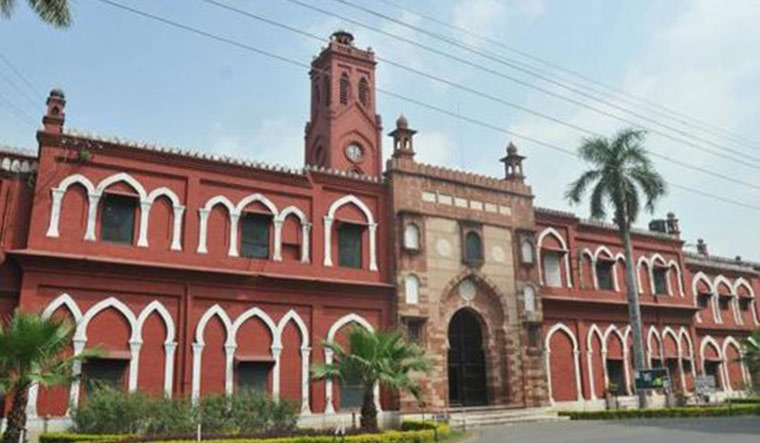Syed Ammar Ahmad suppresses a coughing fit as he talks on the phone from Aligarh.
Ahmad, a BA sociology student from Aligarh Muslim University, tells THE WEEK that he bathed and disinfected a dead body before cremation a few days ago.
"This man, I don't really know him. He lives outside my campus. I got a call that he died from COVID-19 -19 and this needs to be done. So I went. He didn't have any family members except for two small kids," says Ahmad. In mid-April he, along with a few other students from campus, formed an SoS collective called Khidmat-e-Khalq (service of humanity), to undertake COVID-19 relief efforts.
Khidmat-e-Khalq, apart from arranging funeral services, also runs a daily clinic. They help with telemedicine, food for isolated patients and also arrange beds, oxygen, cylinders and counselling. Ahmad decided to form this group after he couldn't help find a ventilator bed for his friend's aunt, who succumbed to COVID-19.
"The list that you have seen of 17 working professors who have died in the last 20 days, that is just the teaching staff. No one is talking about the non-teaching staff who have died of COVID-19," says Ahmad in his self-isolation where he is fielding harried calls every minute. "I went to the graveyard in the AMU campus to speak to the gravediggers and they said the digging goes on till three and four in the night."
In the last one month, Aligarh Muslim University has reportedly lost more than 30 serving and former teaching staff to COVID-19. This has raised fears that "a particular viral variant may be circulating in the Civil Lines area of Aligarh in which AMU and many adjoining localities are situated," according to Vice-Chancellor Tariq Mansoor, who wrote this in a letter to the CSIR-Institute of Genomics and Integrative Biology in New Delhi, where samples have been sent for genome sequencing.
The death toll includes a much-respected doctor, Shadaab Khan, head of the Medicine department at AMU's Jawaharlal Nehru Medical College and Hospital.
"He was the most senior doctor at the JNMC who died. He served many COVID patients," says Ahmad. "More than 30 teachers and academicians are currently admitted there."
Many AMU students, who have doubled up as medical runners and volunteers in this grave hour, say the number of deaths is under-reported. Ayesha Lisa, in her final year of an MA in psychology, sends a two-day-old WhatsApp list with 43 names of faculty, working and retired, who have lost their lives to the infection.
"There are more added to this list, but I don't have their names. Around 50 have died," says the 23-year-old who hasn't attended any online class for the last three weeks and is mostly busy arranging plasma, blood, ICU beds, ventilator, oximeters, free medicines and food for those without funds. The chairman and a professor in her department died of Covid-19.
"We have not had any contact classes for the last one year and I can't understand where and how are they catching this infection when everyone has been working from home."
However, the Chief Medical Superintendent (CMS) and principal of JNMC, Prof Shahid Ali Siddiqui, denied the exaggerated figure of deaths doing rounds on social media in a statement today. In a rejoinder, the professor stated, “AMU has been bereaved of 18 faculty members since the onset of the second COVID wave, out of which 15 were either Covid or suspected COVID patients. Three patients have died because of non-COVID reasons such as brain tuberculosis and liver disease. And moreover, out of the 15 Covid or suspected COVID deaths, four have occurred outside Aligarh”.
The statement adds, “These social media posts have also wrongly mentioned that the retired faculty members who died in the past one month were all undergoing treatment at JNMC. We like to make it clear that many of these superannuated faculty members were not even in Aligarh at the time of their deaths.”
"You'd be very lucky if the helpline numbers provided by the government and even the private entities actually work," says Ansab Aamir, a final year B. Tech student of mechanical engineering from AMU.
Since mid-April, Aamir has become part of five student-led SoS initiatives. "[The] situation is really bad here. The viral list includes current and ex-"prominent" professors. This is just the tip of the iceberg. So many people in the technical, non-teaching and clerical departments of AMU have also died. I receive approximately 100 distress calls every day for oxygen and blood. Three days back we arranged an oxygen cylinder for a six-month-old girl who had undergone surgery," he said.
The 22-year-old remembers how the gravediggers broke down at the Shah Jamal Qabristan when he went there three days ago. By noon, they had already dug twelve graves. Aamir had to go inside a grave to lower the body of a person he never knew.
"There is a provision in Islam that the most immediate family member or the person who is the fittest is supposed to get inside and lower the body. None of their present family members were fit enough or present there to go in, so I went inside the grave to lower the body," he says on the phone, almost gulping for air.
"The only thing that keeps me going is when my father says 'I'm proud of you.'"





